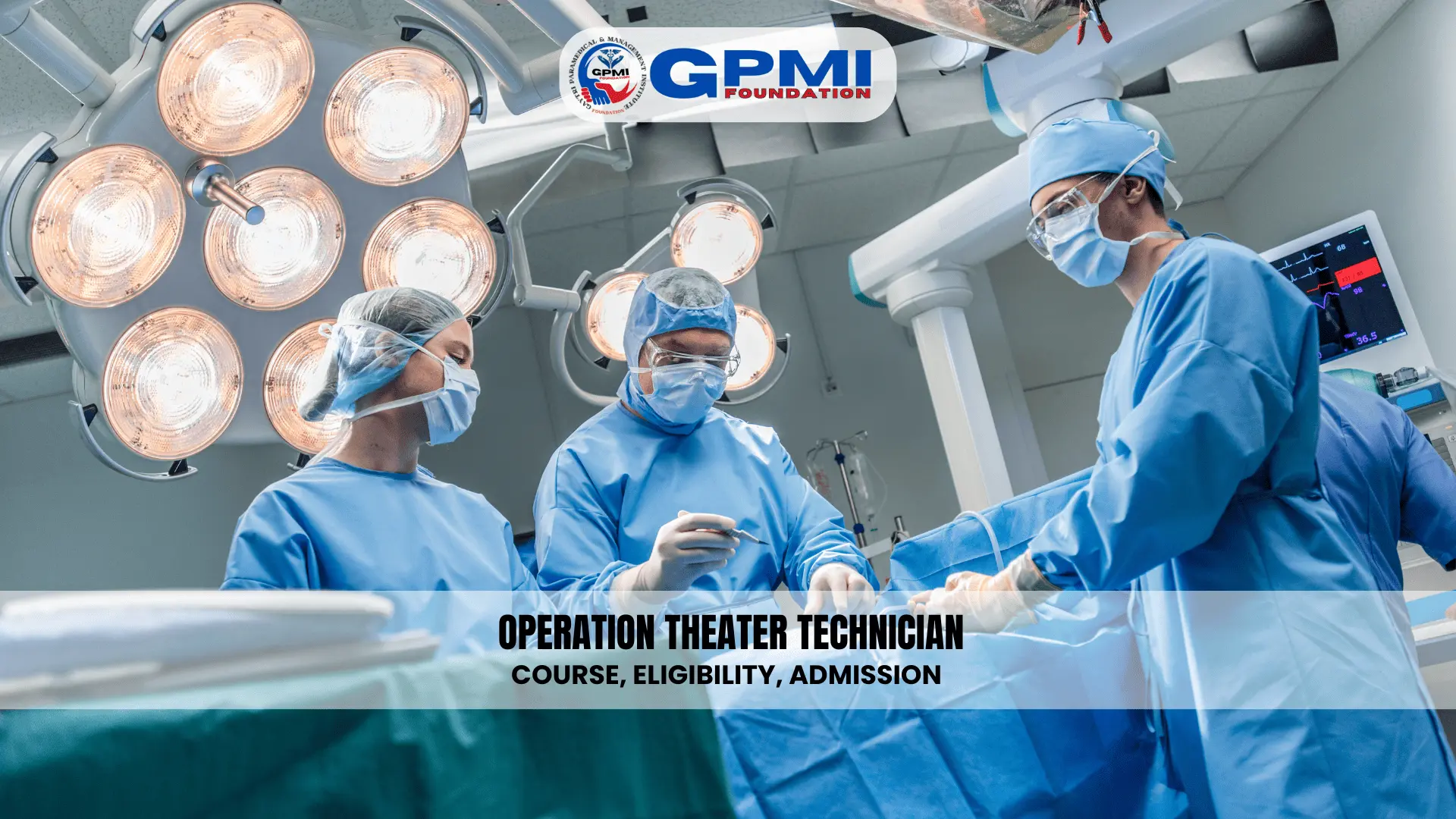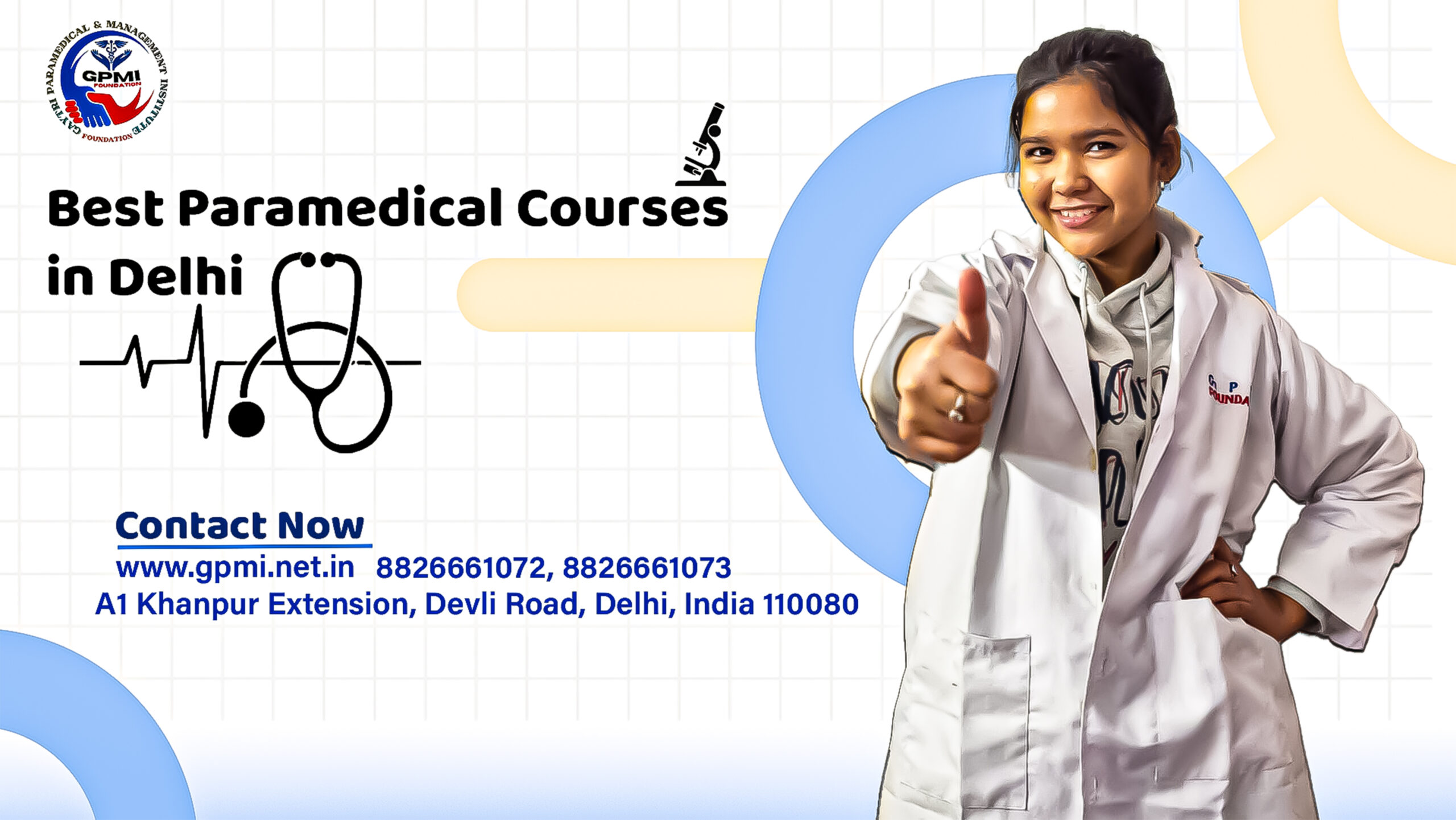OT Technicians are vital members of the surgical team, responsible for preparing operation theaters, sterilizing instruments, and assisting surgeons during procedures.
They ensure a sterile and safe environment, monitor patient conditions, and manage emergency situations. With the rising demand in hospitals, trauma centers, and surgical units, OT Technicians play a key role in ensuring smooth and successful surgeries, making them an essential part of modern healthcare.
Today we will learn all about OT Technology, the courses, eligibility, the admission process, and the easy 6 steps to become a qualified OT technician. So lets dive into the details.
Table of Contents
What is OT Technician?
An OT Technician (Operation Theatre Technician) is a healthcare professional responsible for preparing and maintaining the operation theatre (OT), sterilizing surgical instruments, assisting surgeons, and ensuring patient safety during surgeries. They play a vital role in surgical teams by handling medical equipment, managing OT records, and supporting anesthetists.
OT Technicians work in hospitals, surgical centers, trauma units, and emergency departments, ensuring smooth and safe surgical procedures. Their expertise in maintaining a sterile environment and assisting in critical surgeries makes them essential in the medical field.
What is OT Technician Course?
An OT Technician Course (Operation Theatre Technician Course) is a professional program that trains students in surgical procedures, operation theatre management, and patient care during surgeries. It covers sterilization techniques, surgical equipment handling, anesthesia support, and emergency response.
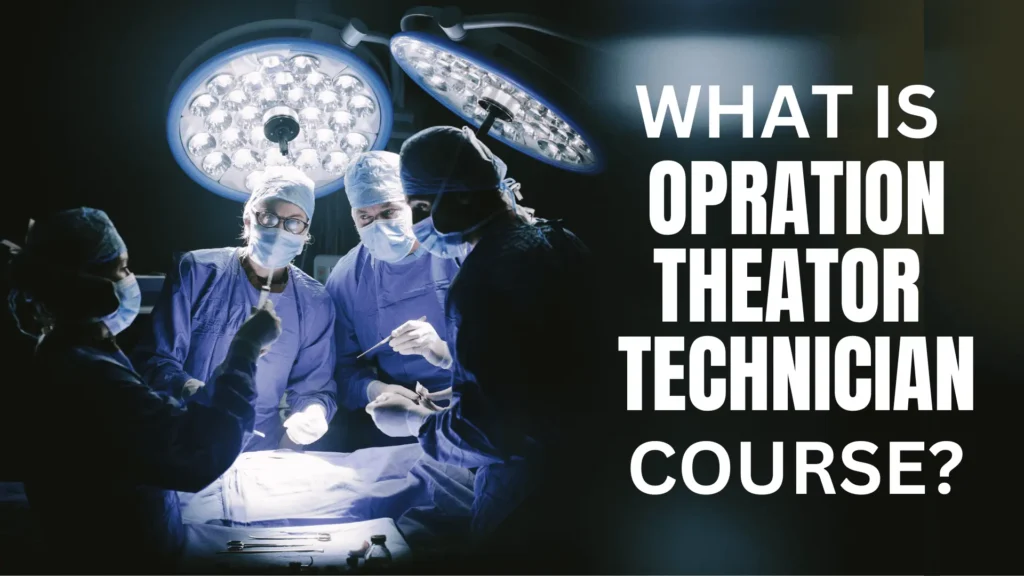
OT Technician Course Details
| OT Technician Full Form | Operation Theater Technician |
| OT Technician Course Duration | 1-3 years (Diploma, B.Voc, or B.Sc.) |
| OT Technician Course Fees | Diploma in OT Technology (1-2 years): ₹30,000 – ₹1,50,000 B.Voc. in OT Technology (3 years): ₹50,000 – ₹2,00,000 per year B.Sc. in OT Technology (3 years): ₹70,000 – ₹3,00,000 per year |
| OT Technician Salary | Freshers (0-2 years): ₹15,000 – ₹30,000 Mid-Level (3-5 years): ₹30,000 – ₹50,000 Experienced (5+ years): ₹50,000 – ₹80,000+ |
| OT Technician Vacancy | hospitals, surgical centers, trauma units, and emergency departments. |
| Elegibility | 12th pass with 45% masks |
OT Technician Courses
OT (Operation Theatre) Technician courses after 12th train students in surgical procedures, sterilization techniques, anesthesia support, and OT management. These courses prepare students for roles in hospitals, surgical centers, and emergency wards.
1. Diploma in OT Technology
- Duration: 1-2 years
- Eligibility: 10th or 10+2 (Science preferred)
- Admission: Direct or merit-based
2. B.Voc. in OT Technology
- Duration: 3 years (Exit options: Diploma – 1 year, Advanced Diploma – 2 years, Degree – 3 years)
- Eligibility: 10+2 (Science preferred)
- Admission: Direct (No entrance exam)
3. B.Sc. in OT Technology
- Duration: 3 years
- Eligibility: 10+2 (Science – PCB/PCM)
- Admission: Merit-based or entrance exam
OT Technician Course Fees in Private Colleges
The fees for OT Technician courses in private colleges vary based on location, institute reputation, and course level. Here’s an estimated fee structure:
| Course | Duration | Fees (Private Colleges) |
|---|---|---|
| Diploma in OT Technology | 1-2 years | ₹30,000 – ₹1,50,000 |
| B.Voc. in OT Technology | 3 years | ₹50,000 – ₹2,00,000 per year |
| B.Sc. in OT Technology | 3 years | ₹50,000 – ₹3,00,000 per year |
Additional Costs:
- Registration & Exam Fees: ₹5,000 – ₹20,000
- Practical & Lab Fees: ₹10,000 – ₹50,000
- Hostel Fees (if applicable): ₹50,000 – ₹1,50,000 per year
Some private colleges offer scholarships, installment payment options, and loan facilities.
OT Technician Course Syllabus
The syllabus for OT (Operation Theatre) Technician courses varies depending on the program level (Diploma, B.Voc., or B.Sc.), but generally includes the following subjects:
1. Core Subjects
- Human Anatomy & Physiology
- Medical Terminology
- Microbiology & Infection Control
- Pharmacology & Anesthesia Technology
- Surgical Instruments & Equipment Handling
- Sterilization & Disinfection Techniques
- Operation Theatre Procedures & Techniques
- Biomedical Waste Management
2. Specialized Topics
- Pre & Post-Operative Care
- Emergency & Trauma Care Management
- Anesthesia & Patient Monitoring
- Surgical Procedures (General, Orthopedic, Cardiac, Neuro, etc.)
- Patient Safety & OT Ethics
- Medical Records & Hospital Management
3. Practical Training & Internships
Most OT Technician courses include hands-on training in operation theatres of hospitals and surgical centers. The detailed syllabus may vary based on the university and course type (Diploma, B.Voc., or B.Sc.). Would you like a syllabus for a specific college?
Job Opportunities After OT Technician Course
After completing an Operation Theatre (OT) Technician course, graduates have multiple career opportunities in the healthcare sector. They are trained to assist surgeons, maintain OT equipment, and ensure a sterile surgical environment. Here are some job roles available:
Job Roles:
- Operation Theatre Technician – Assists in surgical procedures by preparing instruments and equipment.
- Surgical Assistant – Works alongside surgeons, ensuring smooth operations.
- Anesthesia Technician – Supports anesthesiologists in managing anesthesia equipment and medication.
- Emergency OT Technician – Handles emergency surgeries in hospitals and trauma centers.
- Hospital OT In-Charge – Manages and supervises OT staff and operations.
- Medical Equipment Technician – Maintains and services OT and surgical equipment.
- Clinical Assistant – Assists in post-operative patient care in ICUs and recovery rooms.
- Private OT Assistant – Works with surgeons in private clinics or specialized surgical centers.
- Instructor/Trainer – Teaches OT technology in paramedical institutes.
Employment Areas:
- Hospitals (Government & Private)
- Trauma & Emergency Centers
- Surgical Clinics
- Nursing Homes
- Medical Colleges & Institutes
- Dialysis & Specialty Care Centers
OT Technician Salary & Perk
An Operation Theatre (OT) Technician plays a vital role in surgical procedures, ensuring a sterile environment and assisting surgeons. The salary and perks vary based on experience, hospital type, and location.
Salary Breakdown (India)
- Entry-Level (0-2 years): ₹15,000 – ₹25,000 per month
- Mid-Level (2-5 years): ₹25,000 – ₹40,000 per month
- Experienced (5+ years): ₹40,000 – ₹60,000+ per month
- Government Hospitals: ₹30,000 – ₹50,000 per month (based on pay scales)
- Private Hospitals & Clinics: ₹20,000 – ₹40,000 per month
- International (Middle East, USA, UK): ₹80,000 – ₹2,00,000+ per month (depending on experience and qualifications)
Perks & Benefits
- Job Stability: High demand in hospitals, trauma centers, and surgical clinics.
- Healthcare Benefits: Medical insurance and health check-ups in reputed hospitals.
- Overtime & Incentives: Extra pay for emergency and night shifts.
- Career Growth: Opportunities to become an OT Supervisor, Anesthesia Technician, or Hospital OT Manager.
- Government Jobs: Better job security, pension, and other benefits.
- International Opportunities: Higher salary packages in countries like the UAE, Canada, and the UK.
Roles & Responsibilities of an OT Technician
An Operation Theatre (OT) Technician is a crucial part of the surgical team, ensuring that the operation theatre is well-prepared and assisting doctors and surgeons during procedures. Their responsibilities include:
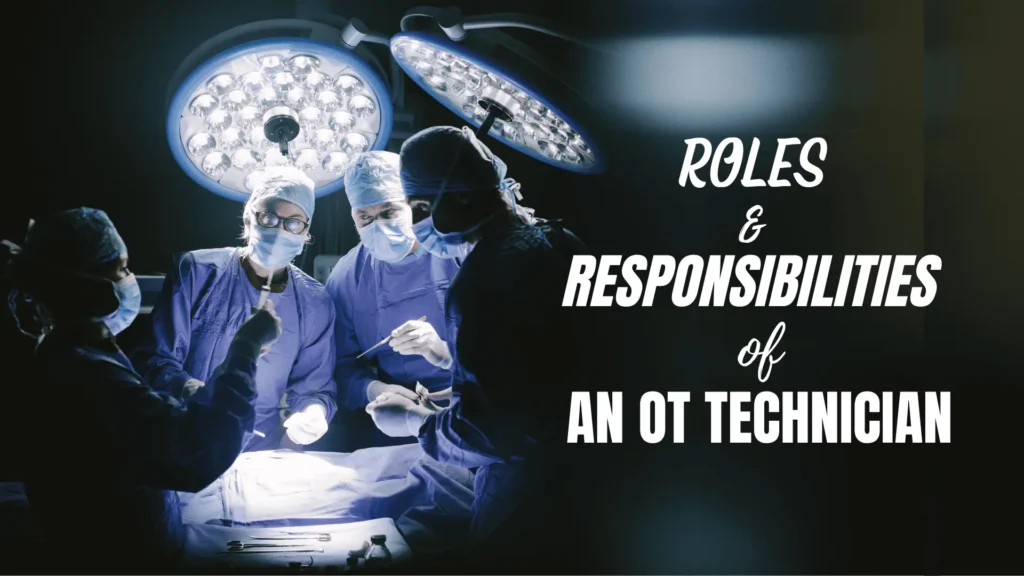
Pre-Surgery Responsibilities
- Preparation of OT Room: Ensuring the OT is clean, sterile, and equipped for surgery.
- Sterilization of Instruments: Cleaning and disinfecting surgical instruments and equipment.
- Equipment Setup: Arranging OT tables, lights, anesthesia machines, and monitoring systems.
- Patient Preparation: Assisting in shifting and positioning the patient before surgery.
- Inventory Management: Keeping track of surgical tools, linen, and disposables.
During Surgery Responsibilities
- Assisting Surgeons: Passing instruments, sutures, and sponges as required.
- Handling OT Equipment: Operating and monitoring medical devices like suction machines and electrosurgical units.
- Assisting Anesthetists: Helping administer anesthesia and manage airway devices.
- Maintaining Sterile Field: Ensuring that no contamination occurs in the surgical area.
- Emergency Handling: Assisting in case of complications, such as cardiac arrest or excessive bleeding.
Post-Surgery Responsibilities
- Cleaning & Disinfecting OT: Sterilizing all used instruments and equipment.
- Patient Recovery Assistance: Helping shift the patient to the recovery room or ICU.
- Restocking Supplies: Replenishing medications, bandages, and sterile kits for the next surgery.
- Waste Disposal: Ensuring proper biomedical waste segregation and disposal.
- Record-Keeping: Documenting procedures, instruments used, and any complications during surgery.
Skills Required
- Strong knowledge of sterilization techniques
- Ability to handle medical equipment
- Good communication and teamwork skills
- Quick decision-making in emergencies
- Knowledge of infection control protocols
Top OT Technician Course Government College
Pursuing a course in Operation Theatre (OT) Technology from a reputable government institution can provide quality education and enhance career prospects. Here is a table with details of the Top 10 Government Colleges for OT Technician Courses in India:
| College Name | Course Offered | Admission Process | Website |
|---|---|---|---|
| AIIMS, New Delhi | B.Sc. in Operation Theatre Technology | Entrance Exam | Visit AIIMS New Delhi |
| PGIMER, Chandigarh | B.Sc. in Operation Theatre Technology | Entrance Exam | Visit PGIMER |
| JIPMER, Puducherry | B.Sc. in Operation Theatre Technology | Entrance Exam | Visit JIPMER |
| SGPGIMS, Lucknow | B.Sc. in Operation Theatre Technology | Entrance Exam | Visit SGPGIMS |
| Government Medical College, Amritsar | B.Sc. in Operation Theatre Technology | Entrance Exam | Visit GMC Amritsar |
| Bangalore Medical College & Research Institute | B.Sc. in Operation Theatre Technology | Entrance Exam | Visit BMCRI |
| Government Thoothukudi Medical College | Diploma in Operation Theatre Technology | Merit-Based | Visit GTMC |
| IPGMER, Kolkata | B.Sc. in Operation Theatre Technology | Entrance Exam | Visit IPGMER |
| AIIMS, Bhubaneswar | B.Sc. in Operation Theatre Technology | Entrance Exam | Visit AIIMS Bhubaneswar |
| AIIMS, Jodhpur | B.Sc. in Operation Theatre Technology | Entrance Exam | Visit AIIMS Jodhpur |
Admission processes typically involve entrance examinations, and eligibility criteria may vary across institutions. For detailed information on courses, admission procedures, and important dates, visit the official websites of these colleges.
Become an OT Technician in 6 Easy Steps…
Become an OT Technician in 6 Easy Steps and start a rewarding career in the healthcare industry. From completing 10+2 to enrolling in a reputed institute, gaining hands-on training, and securing a job, this guide simplifies the process.
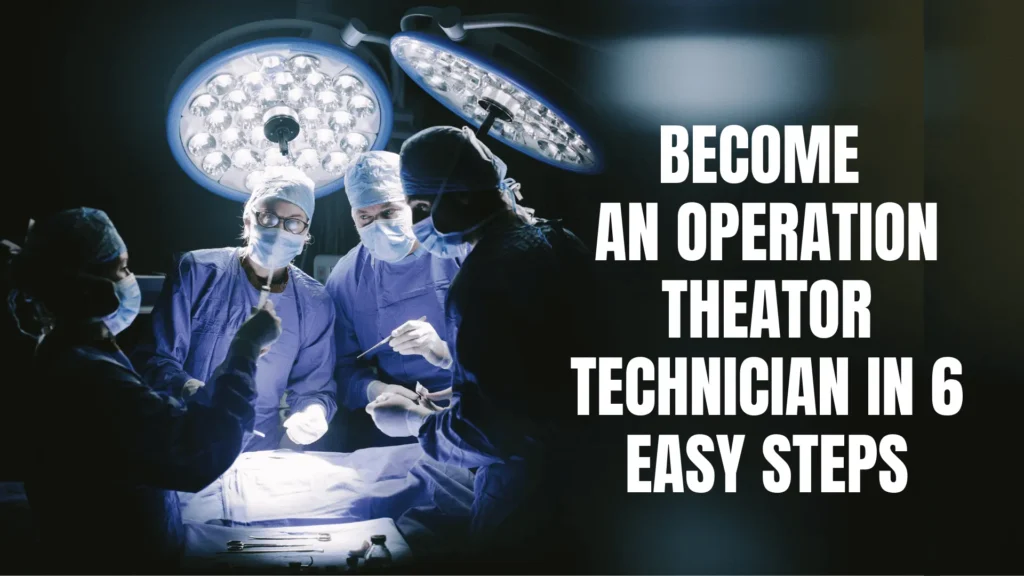
Follow these steps and kickstart your journey in the operation theatre today!
1. Complete Your Education
To enroll in an OT Technician course, you must have completed 10+2 with Science (Physics, Chemistry, Biology). Some diploma programs also accept 10th pass students. Strong foundational knowledge in science is essential for understanding surgical procedures and medical equipment.
2. Choose the Right Course
There are multiple options based on your career goals:
- Diploma in OT Technology (1-2 years) – Short-term course for quick entry into the field.
- B.Voc./B.Sc. in OT Technology (3 years) – Advanced training with better job prospects.
- PG Diploma in OT Technology (1 year) – Specialization for graduates seeking higher roles.
3. Enroll in a Reputed Institute
Select a government-recognized institute like GPMI Foundation, which provides quality education, hands-on training, and placement support. Ensure the institute offers modern labs and experienced faculty for practical learning.
4. Gain Practical Training
Internships in hospitals and surgical centers are crucial. You will learn about sterilization techniques, anesthesia support, OT setup, and assisting in surgeries. Practical exposure enhances confidence and employability.
5. Get Certified & Apply for Jobs
Upon completion, obtain your diploma/degree certification and apply for jobs in hospitals, trauma centers, and private clinics as an OT Technician, Surgical Assistant, or Anesthesia Technician.
6. Start Your Career & Upgrade Skills
With experience, you can move into supervisory roles or specialize in surgical procedures. Consider advanced certifications for better salary and career growth.
By following these six simple steps, you can build a rewarding career in healthcare as an OT Technician. With the growing demand for skilled professionals in hospitals and surgical centers, this field offers job security, career growth, and hands-on experience in life-saving procedures.
Why GPMI Foundation
The Gaytri Paramedical & Management Institute (GPMI) Foundation is dedicated to providing quality paramedical education with a focus on practical skills and career opportunities. Here’s why GPMI is the right choice for an OT Technician Course:
1. Industry-Focused Curriculum
- Covers sterilization techniques, OT equipment handling, anesthesia support, and emergency care.
- Hands-on training in operation theatres to develop real-world skills.
2. Experienced Faculty & Practical Training
- Taught by skilled professionals with years of experience in surgical assistance.
- Access to modern labs and OT setups to ensure practical exposure.
3. Strong Placement Support
- Job opportunities in hospitals, surgical centers, and trauma care units.
- Guidance for internships in reputed medical institutions.
4. Direct Admission & Affordable Fees
- No entrance exam is required, making it accessible for students.
- Competitive course fees with easy EMI or scholarship options.
5. Certification & Career Growth
- Government-recognized diploma/degree ensuring job security & credibility.
- Opportunity for higher education in B.Voc, B.Sc., or specialization courses.
GPMI focuses on skill development, employability, and practical experience, making it an ideal choice for students pursuing a career as an OT Technician. Would you like detailed admission procedures?
Conclusion
Choosing the OT Technician Course at GPMI Foundation ensures quality education, hands-on training, and strong career opportunities. With industry-focused learning, expert faculty, modern labs, and direct admission, students gain the skills needed to excel in hospitals, surgical centers, and trauma care units. GPMI’s affordable fees, placement support, and government-recognized certification make it a smart choice for a stable and rewarding career in healthcare.
I hope you enjoyed the post “How to Become an OT Technician in 6 Easy Steps?” Please share it with someone who can benefit from it, whether they are looking to start a career as an OT Technician or exploring opportunities in the healthcare field. If you have any questions, feel free to ask in the comments. Stay connected for more informative content!
Frequently Asked Question
Find answers to frequently asked questions about the OT Technician course, including eligibility, career opportunities, salary, and more. Get all the details you need to start your journey in the healthcare field!
What is the qualification for an OT Technician course?
The minimum qualification is 10+2 with Science preferred. Some diploma courses accept 10th pass students.
What are the career opportunities after completing an OT Technician course?
Graduates can work as OT Technicians, Surgical Assistants, Anesthesia Technicians, and OT Supervisors in hospitals, clinics, and trauma centers.
What is the salary of an OT Technician in India?
Entry-level: ₹15,000 – ₹25,000 per monthExperienced: ₹40,000 – ₹60,000+ per monthInternational Jobs: ₹80,000 – ₹2,00,000+ per month
Is an OT Technician course a good career option?
Yes, it offers job stability, career growth, and high demand in hospitals and surgical centers. It is a great choice for those interested in operation theatre and surgical procedures.
What is the difference between OT Technology and MLT?
OT Technology deals with surgical assistance, OT equipment management, and patient preparation.MLT (Medical Lab Technology) focuses on diagnosing diseases through laboratory tests and sample analysis.
Which is better: a diploma or a degree in OT Technology?
A Diploma (1-2 years) allows quick entry into the job market.A B.Voc/B.Sc. (3 years) offers better career growth and higher salary prospects.
Do NEET Scores Matter for OTT Admission?
No, NEET scores are not required for admission to an Operation Theatre Technician (OTT) course. Most institutes offer direct admission based on 10+2 with Science (PCB) or 10th pass for diploma courses.
Is Operation Theater Technologist a Doctor?
No, an Operation Theatre (OT) Technologist is not a doctor. They are healthcare professionals who assist surgeons, anesthetists, and nurses during surgical procedures.
What is the age limit for OT Technician?
17 – 35 years (varies by institute)
B.Voc./B.Sc. in OT Technology: 17 – 30 years (some institutes allow older candidates)
Certificate Courses: No strict age limit, but generally 17+ years
Some government colleges may have specific upper-age limits, so checking with the chosen institute is recommended.


